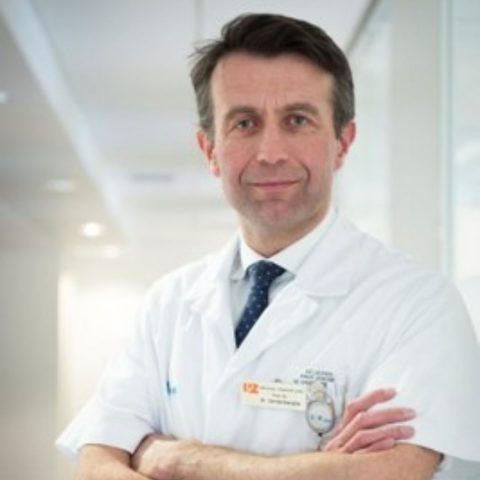Professor Wim Vandenberghe is a neurologist at the University Hospital and a neuroscientist at the Catholic University of Leuven, Belgium. He specialises in neurodegenerative disorders and Parkinson’s disease in particular. Professor Vandenberghe is also on the Demoucelle Parkinson Charity board and kindly agreed to answer some questions about Parkinson’s disease and research.
When asked what key message he would like to convey during the interview, Professor Vandenberghe mentioned not one but two: “Parkinson’s) disease is much more common than people think, AND a lot of research is still needed to improve treatments. There is still a kind of taboo around Parkinson’s disease. Many patients are ashamed and withdraw, which reduces the visibility of the disease.”
According to Vandenberghe, both patients and informal carers can help reduce the taboo around Parkinson’s. “For patients, it is important to share their diagnosis early with their close family and friends. Trying to keep the diagnosis hidden from those closest to them for a long time only creates additional stress for the patient.”
“Carers should encourage patients to stay active and not to be too concerned about comments from outsiders. They can reassure patients by saying that their symptoms are not as noticeable as they think, and that many people have medical problems. It is crucial to be open with one’s close circle and ignore silly comments from outsiders.”
 Vandenberghe is realistic about the challenges he and other Parkinson’s researchers face. “Parkinson’s is a multifactorial and heterogeneous disease, which complicates research. There are multiple causes of Parkinson’s, and the proportion to which these causes are implicated varies from patient to patient. The mechanisms triggered are also likely to differ from patient to patient. The field is still struggling with how best to approach this heterogeneity. Can we divide Parkinson’s into subtypes? And what are the best ways to do so? This makes research complex.”
Vandenberghe is realistic about the challenges he and other Parkinson’s researchers face. “Parkinson’s is a multifactorial and heterogeneous disease, which complicates research. There are multiple causes of Parkinson’s, and the proportion to which these causes are implicated varies from patient to patient. The mechanisms triggered are also likely to differ from patient to patient. The field is still struggling with how best to approach this heterogeneity. Can we divide Parkinson’s into subtypes? And what are the best ways to do so? This makes research complex.”
“A further complication is that the relevant cells are difficult to access because they are in the brain. Brain tissue can be examined after death, but that only provides information about an advanced final stage of the disease. This is similar to trying to figure out the cause of a plane crash by analysing the debris without having the black box.”
“In addition, the chronic and slowly progressing nature of Parkinson’s makes it difficult to realistically model the disease process in the laboratory. A realistic laboratory model for Parkinson’s disease should be very similar to and evolve slowly like human Parkinson’s, but this would mean that researchers would have to wait decades before visible changes occur. This is not compatible with the way science evolves. In the laboratory, we need faster models, but these in turn introduce artefacts (something that is not naturally present but occurs as a result of the preparative or investigative procedure) that no longer really match the real disease.”
Yet despite these complications, Vandenberghe is optimistic. “Although a cure is unlikely in the short term, there are reasons to hope for major breakthroughs within 10 to 20 years. We already have symptomatic treatments that work reasonably well in the early stages of the disease, but they fall short in the advanced stages, especially with cognitive impairment, gait and balance problems. A treatment that could reduce deterioration by 30% would already make a big difference and prevent the disease from reaching severe stages in many patients.”
 “As a neurologist and a researcher, I am driven by two motivations. On the one hand, a humanitarian motivation, because I see the need for better treatments for Parkinson’s every day. But there is also a purely scientific, intellectual challenge. Neurodegenerative diseases are challenging problems to solve. So that is quite a special combination. In addition, meeting individual patients helps to maintain focus and resilience in research.”
“As a neurologist and a researcher, I am driven by two motivations. On the one hand, a humanitarian motivation, because I see the need for better treatments for Parkinson’s every day. But there is also a purely scientific, intellectual challenge. Neurodegenerative diseases are challenging problems to solve. So that is quite a special combination. In addition, meeting individual patients helps to maintain focus and resilience in research.”
Asked what he considers to be his greatest contribution to Parkinson’s research so far, Vandenberghe replied, “My research group was the first to discover that inhibition of a certain type of enzyme called deubiquitinase has a beneficial effect in Parkinson’s models. This therapeutic concept is now in further development and is already being investigated in a Phase 1 study.”
At the end of the interview, Vandenberghe chose to make an impassioned appeal. “Patients and their loved ones should not give up too quickly, even in deep moments of crisis. Psychiatric symptoms in Parkinson’s can sometimes be reversible, even in severe situations. Psychosis and major depression can sometimes recover surprisingly well, even after prolonged periods when courage is almost lost.”
“A motto that inspires me, attributed to William of Orange, is: “It is not necessary to hope to undertake, nor to succeed to persevere.” This means keep trying and don’t give up. This applies both to patients’ daily struggles and to scientific efforts to develop better treatments.”

